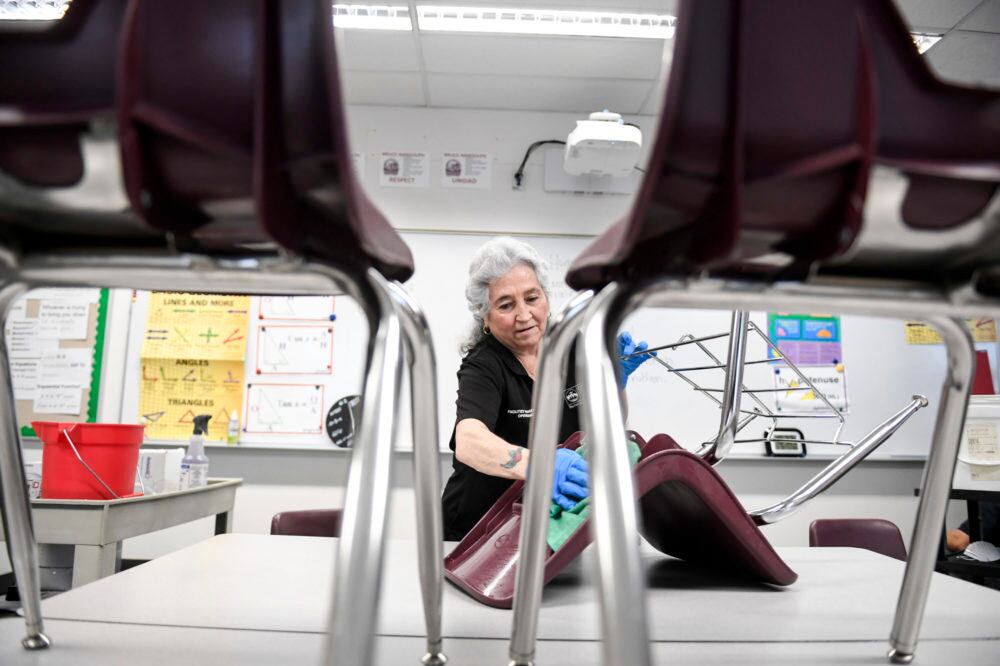Bus drivers, custodians, teacher’s aides, and other hourly wage workers in Denver schools say the district isn’t treating them fairly in negotiating pay raises for next school year.
“We have been offered less than teachers, even though we will also be on the front lines of this COVID crisis,” said Lisa Archuleta, an elementary school facility manager.
Denver Public Schools has been bargaining for several weeks with eight unions representing hourly wage workers. For the first time, the unions are negotiating as a single bloc instead of separately. Their aim was to increase their bargaining power at a time when the district had to cut $65 million from next year’s budget due to a drop in state funding.
In making the cuts, the district pledged to protect the wages of workers making $25 an hour or less. Whereas top district administrators will see their salaries reduced, the district offered to increase the pay of hourly wage workers by 0.5% to 1.9%.
But in separate negotiations, the district agreed to give bigger raises to teachers. Last month, the district and the Denver Classroom Teachers Association agreed to raises estimated to be from 3.5% to 4%, less than what teachers were originally slated to get.
Now, the eight unions representing hourly wage workers want a similar increase.
“It makes me so angry to see DPS’s bargaining team continue to offer us poverty wages and to treat us like we are disposable,” said Tonya Cordova, a special education paraprofessional.
Archuleta noted most hourly wage workers are people of color who must live paycheck to paycheck — a reality that contradicts Denver Public Schools’ stated value of equity.
“We are the silent heroes of the school,” said Janelle Martinez, an elementary school custodian. “What we’re asking is that DPS show us you care and that we actually matter.”
District officials say they’re committed to making sure everyone earns a livable wage.
“We deeply value the work of our [education support professionals] and their roles in ensuring our schools run smoothly,” district spokesperson Winna MacLaren said.
The district and the eight unions last met June 30 but did not come to an agreement.
The district’s last proposal would equate to a 2% raise next year for all hourly wage workers, plus another 0.6% if the district decides to ask Denver voters for a tax increase in November — and if voters approve it. A 2.6% raise for hourly wage workers would cost about $3.3 million, according to Mark Ferrandino, the district’s deputy superintendent of operations.
The last proposal from the unions would equate to a 3.6% raise, plus another 0.6% if Denver voters approve a tax increase, Ferrandino said. A 4.2% raise for hourly wage workers would cost about $5.4 million, he said — putting the two proposals about $2.1 million apart.
Lynne Valencia-Hernandez, a Denver teacher who supports the hourly wage workers, said Denver Public Schools should take that $2.1 million difference from its $100 million budget reserve, sometimes referred to as the district’s “rainy day fund.”
“If a pandemic isn’t a rainy day, I don’t know what else is,” Valencia-Hernandez said.
But the district’s budget for the 2020-21 school year already draws on $28 million in reserves. District officials are wary of dipping any deeper into that fund.
MacLaren also pointed out that the district has increased pay and benefits for low-wage workers in recent years, committing to raising the minimum wage to $15 even before a city mandate to do so. Unlike other districts around the country, Denver Public Schools has avoided layoffs during the coronavirus pandemic, she said, and kept all of its nearly 3,800 hourly wage workers on the payroll while schools were closed to in-person learning at a cost of $29 million.
The next bargaining session is scheduled for Monday.
This story has been updated to reflect the raises hourly wage workers would get if Denver voters approve a tax increase in November.






